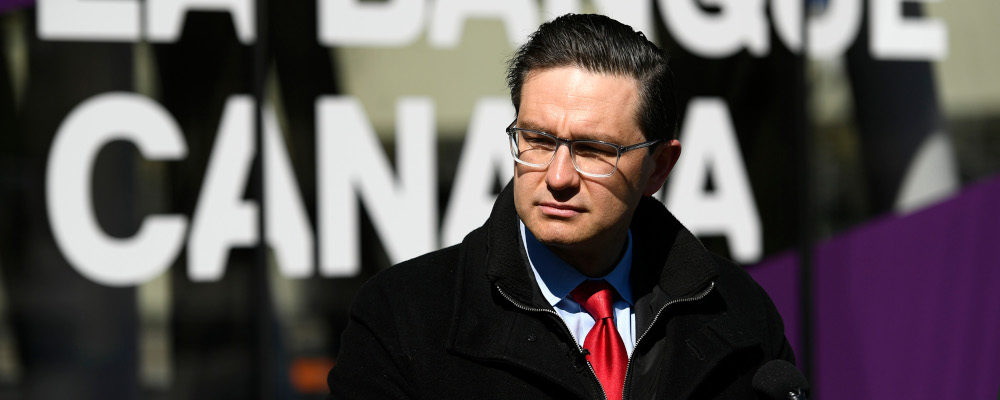A few months ago I wrote in The Hub about “the gatekeepers.”1Going after Canada’s elite gatekeepers could be a winning strategy for the next Conservative leader https://thehub.ca/2022-02-21/going-after-canadas-elite-gatekeepers-could-be-a-winning-strategy-for-the-next-conservative-leader/ In the piece, I argued that an old speech that Pierre Poilievre gave on the floor of the House of Commons about the gatekeepers making life harder and more expensive for ordinary Canadians had the potential to be turned into a bigger message and campaign vision. That it could propel Poilievre to the Conservative leadership and help both energize the Conservative base and bring new voters into the party fold. That this message has the potential to build a formidable electoral coalition that could even bring him to the Prime Minister’s Office as well. I suggested that going after the gatekeepers would allow Poilievre to thread the needle between the more conventional conservatism while still tapping into the populist moment Canada seems to be undergoing.
The gatekeepers have played a fairly significant part in Poilievre’s campaign messaging thus far, and it appears to be resonating. This suggests he should carry it into his tenure as leader. But this message has the potential to be more than just a communications strategy. It has the makings of a serious policy agenda that Canada desperately needs to escape our troubling economic prospects.
So far, the Poilievre campaign, despite its significant success and momentum, has been relatively light on policy ideas. This isn’t necessarily a bad thing, given the nature of leadership campaigns. Fortunately, building out an anti-gatekeepers economic agenda from the rhetorical frame he’s erected is something Poilievre and his team could easily do with a strong mandate and support from the party.
A recent OECD assessment projected that Canada’s real GDP growth per capita from 2020-30 will be just 0.7 percent annually, dead last among OECD countries.2The Long Game: Fiscal Outlooks to 2060 Underline Need for Structural Reform https://www.oecd.org/economy/growth/scenarios-for-the-world-economy-to-2060.htm This should concern us all. There’s of course more to life than economic growth, but sluggish and stagnant growth will leave most of us poorer and with lower standards of living. Even before COVID we were suffering from a long-term economic malaise and stagnation. The Hub’s Sean Speer has written about this “two percent trap.”3BEYOND TWO PERCENT: The Case for Economic Growth in the Post-Pandemic Age https://ppforum.ca/wp-content/uploads/2021/04/TheCaseForEconomicGrowthInThePost-PandemicAge-PPF-April2021-EN-2.pdf Canada’s economy is hobbled in a variety of ways by overbearing bureaucratic restrictions and regulatory capture that have helped contribute to Canada’s abysmal productivity growth in the 21st century.
Even recent talk of a “roaring recovery” post-pandemic is not quite the good news it seems. Canada has, on the surface seen an impressive labour market recovery as we come out of the pandemic, fully recovering pre-pandemic jobs. But as Speer has also astutely pointed out, nearly all of this growth has been in public sector employment, and Canada’s roaring recovery looks very much like a “G-shaped recovery.”4Canada’s ‘roaring’ recovery is not as robust as it seems https://thehub.ca/2022-07-08/sean-speer-canadas-roaring-recovery-is-not-as-robust-as-it-seems/ This is a troubling sign, as more of Canada’s economy, and Canadians, become part of a public sector class economic, stagnation may be accompanied by sharper and nastier social and political divides between the public sector and everyone else.
These are serious and pressing economic challenges that Canada faces, ones the present government seems wholly uninterested in addressing. A Poilievre-led Conservative Party would have a serious opportunity to take up this challenge and make a compelling case to Canadians for why they deserve to govern. Conservatism is predicated on prudence and realism about what government can accomplish and what it should aim to accomplish. An ambitious pro-growth agenda is desperately needed, but no one should be under any illusions about the ability of the federal government to single-handedly solve these problems from the top down.
Instead, an anti-gatekeepers agenda could help to revive Canada’s sluggish and sclerotic economy by removing some key barriers that are making Canada an increasingly expensive place to live and an unattractive place to invest and do business.
A good place for Poilievre to start is housing. NIMBY gatekeepers have been a target for Poilievre already, and he is tapping into real alienation and discontent. But it isn’t just young renters who are hurt by Canada’s insane housing market. Canada funnels more capital into housing than any other OECD country. Around 37 percent of gross fixed capital formation (think investment) is sunk into housing. This is bad for the entire economy. Why put capital into a business or invest in potentially productive and innovative things when you get a better return on real estate? Getting Canada back on the path to growth means ending our addiction to real estate. The federal government cannot solve this problem alone; ultimately, local and provincial governments are going to have to do this. But the federal government can still play a role, ensuring federal transfers to cities are dependent on getting serious about increasing housing supply and using the bully pulpit to put serious pressure on cities and provinces to take meaningful action.
Much of the Canadian economy is characterized by oligarchic capture. This makes life more miserable and expensive for most of us. This has been on full display recently in two of the worst oligarchic sectors in Canada, namely air travel and telecoms, where a lack of competition and control by corporate gatekeepers means Canadians pay a lot more than other people for mediocre services. The Rogers outage exposed the vulnerabilities of our oligarchic telecoms sector, one that is protected in legislation by domestic ownership requirements. Removing this from the Telecommunications Act would potentially open up the Canadian telecommunication industry to more competition, and help lower costs for Canadians who pay some of the most expensive rates in the world. But doing so will require taking on Canada’s oligarchic telecoms gatekeepers.
Similarly, Canadians have been experiencing a summer of insane travel delays and issues. Canadian airlines have similar domestic ownership requirements, and only domestic airlines are allowed to fly domestic routes. This means Canadians pay obscene amounts to fly within Canada and get mediocre and subpar service as a result. And it isn’t just the airline industry. Canada’s airports have some of the highest landing fees in the world which increase the cost of flying. Taking on Canada’s aviation gatekeepers and increasing competition would make travel in Canada cheaper, and would encourage us to actually travel more within our own country instead of being a “nation of strangers” who prefer to travel abroad, in part because of costs.
And any prime minister serious about unlocking economic growth in Canada would also make a real effort to finally get rid of the litany of interprovincial free trade barriers. In many cases, it is easier for EU countries to trade with each other than it is for trade to cross between our own provincial borders. There have been efforts to do this in recent years, with provinces like Alberta leading the way, and agreements including the Canadian Free Trade Agreement (CFTA) and the New West Partnership being enacted. But barriers still exist, and it is finally time to end this national embarrassment.
This is not an exhaustive list of Canada’s gatekeepers and economic problems. There are gatekeepers in plenty of other sectors, like agriculture, banking, insurance, and groceries that could be taken on. There are no silver bullets and it will take a broader set of policies to kickstart Canadian growth. But what this should illustrate is that there really is some substance and truth to the idea that Canada, and ordinary Canadians, are hobbled by self-interested elite economic and corporate gatekeepers who need to be challenged. Taking them on really is low-hanging fruit for any politician serious about making life substantially more affordable for Canadians.
Economic growth has not been a priority for the current Liberal government. The government has not been afraid to spend money, but there is little evidence that it gives much thought to bread and butter economic questions like competitiveness and productivity. Just ask Bill Morneau, the former Liberal finance minister. In a recent speech to the C.D. Howe Institute, he said that he struggled in his time in government to get Trudeau and co. to take Canada’s various lagging economic indicators and challenges seriously. He criticized the government for focusing on wealth redistribution instead of growing the economic pie and said that he is much more worried about Canada’s economic situation now than he was in 2015.
On the rare occasions when the Liberals have paid lip service to things like growth and competitiveness, their approach has been in essence to simply create even more gatekeepers on the expectation that innovation and competitiveness can be driven by government subsidies and handouts. Take for example our extremely expensive “superclusters” that were supposed to create innovation hubs across Canada. Or the Canada Infrastructure Bank that the government created in 2017 that a House of Commons committee recently recommended be abolished.
A serious Conservative pro-growth, anti-gatekeepers policy agenda contrasts nicely with the Liberal vision of frivolous spending and subsidized growth where bureaucrats pick winners and losers. It would make the next election a real battle between rival economic visions for the country.
Pierre’s populist-inspired gatekeepers agenda could do more than just focus legitimate anger at the status quo. It could channel the discontent in this country into something actually productive and be the practical solution we desperately need. It could be a perfect example of populism done right.
Canada’s dour economic prospects are a choice. It doesn’t have to be this way. Canada is a safe, stable democracy blessed with an abundance of natural resources. We are one of the world’s most well-educated countries, and people from all over the world still want to come and live here and build new lives in Canada. We remain a country with enormous economic potential. Taking on Canada’s gatekeepers, who are unlikely to earn much sympathy from the Canadian public anyway, is a necessary and important step to capitalizing on it.
Canada needs a serious pro-growth prime minister, one who is willing to take on Canada’s privileged and mediocre elites. Poilievre should seize this opportunity and turn his effective campaign message into a potent policy and governing agenda.
Fire the gatekeepers. Unlock Canada’s potential.




